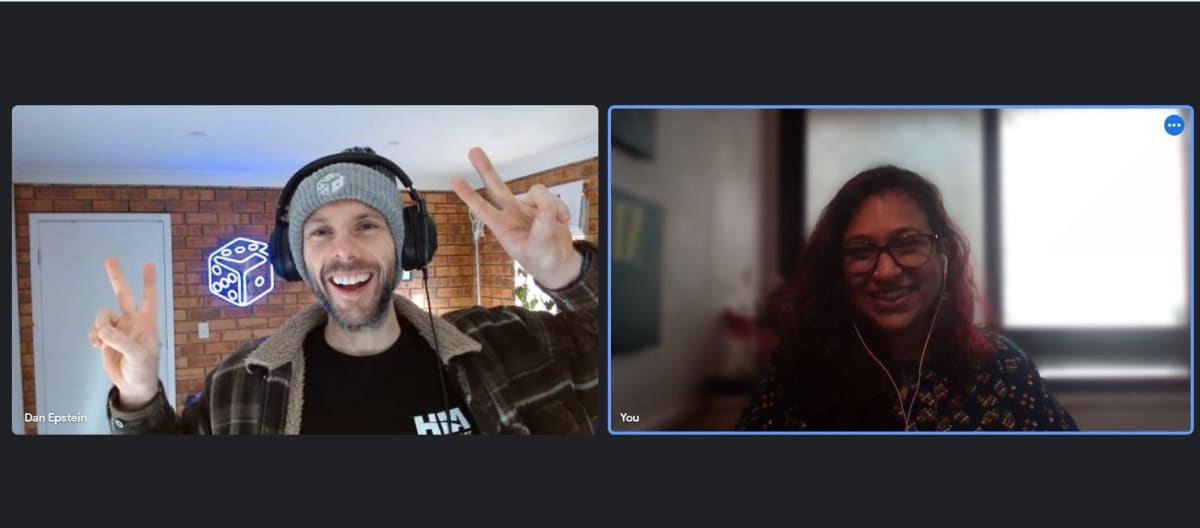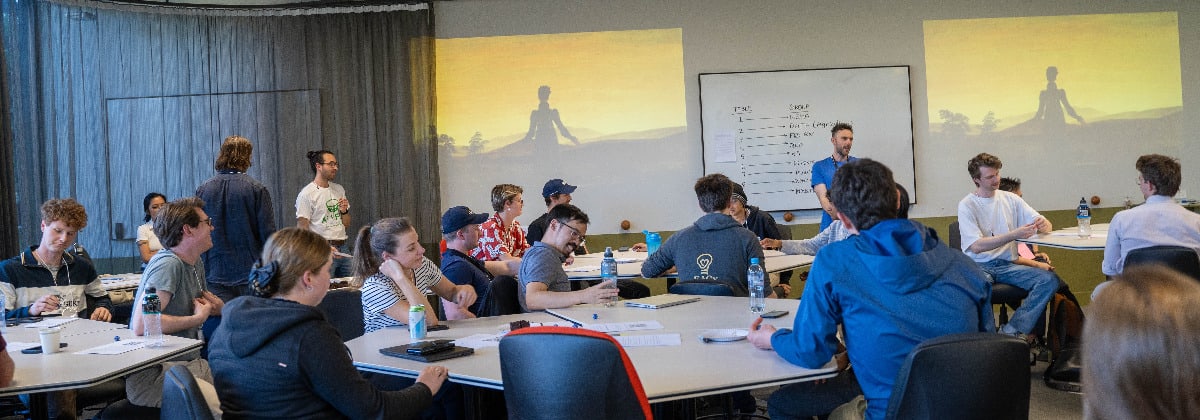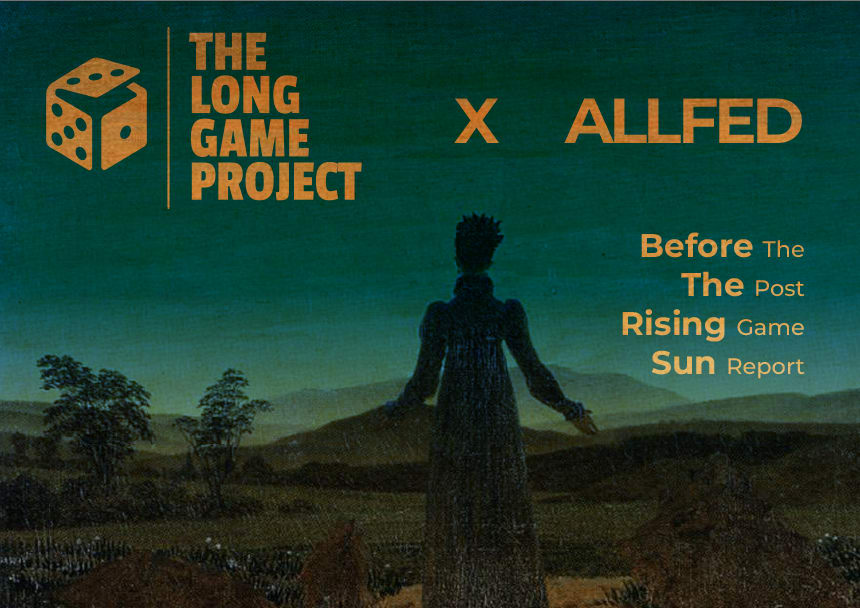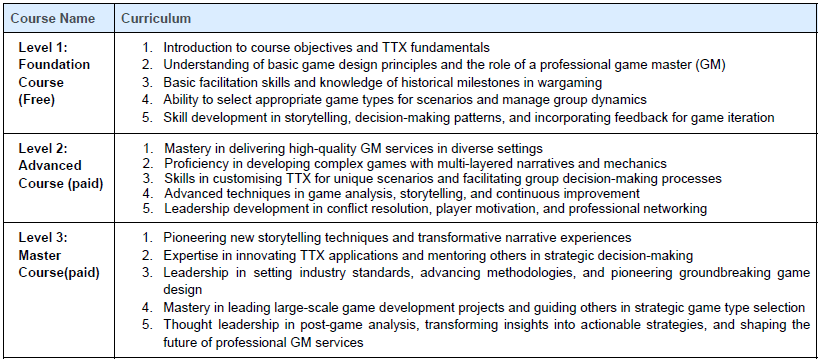- LGP year in review
- Highlights
- Learnings
- Free Content
- Game system
- Experts needed
But first, a wholesome photo of us on 'launch day' over a year ago now.

The Long Game Project (LGP) aims to improve institutional decision-making (IIDM), planning, forecasting and creative thinking using tabletop exercises (TTXs) and scenarios.
We aim to improve the way leaders practise decision-making and thinking when the stakes are low to prepare for when the stakes are high. To help challenge judgments, identify mental mindsets, stimulate creativity, manage uncertainty, and improve dynamic awareness. We are improving how table-topping is done.
1. First year by the numbers
- Large events run 5
- Biggest game 51 players
- Total Marketcap of clients $3.4B
- Scenarios designed 135
- Net Promotor Score 74.9 🤯
(Sanjana tells me this net promotor score means that when people use us, they are very likely to recommend us. A short little Google shows me that we are currently in the world-class elite category)
By the letters:
- Organisational Goals and Objectives:
- Be the place to point to for advice and tools on tabletop exercising
- Provide expert-level thought leadership and consultation
- Lower the entry bar by producing tools and giving guidance and expertise.
- Empower institutions to tackle complex challenges effectively by transforming how they plan, react, and adapt in an increasingly uncertain world.
- Encourage a culture of running organisational games and building a community around tabletop games.
- Empower those who want to run more games and exercises.
2. Highlights
1. A big highlight for me was the massive 51-person game we ran with Allfed to simulate what would happen if a giant volcano went off and threw so much ash into the air that our crops would fail for 10 years. Scary. I heard from many at EAGx MEL that is was their highlight of the conference, and giving a spotlight to the awesome work by ALLFED was a delight.
View our Writeup, Download the full report or see the raw data.

The post-event impact culminated with us drafting a letter with our findings to the Government, which led to a meeting between ALLFED x LGP x Good Ancestors Policy x AUS Dep. HOMELAND SEC around all hazards risks, which is an amazing impact at the Federal Government level.

2. Co-written grant application submission alongside the Asia Pacific Leadership Network (APLN) to run a Multinational Nuclear Wargame in 2025 in Korea
3. AI policy game run for high-level members of the AI community from different backgrounds at the LAISR conference in the USA
4. Introduction to tabletop exercising workshop run for the EA Consulting Network (EACN)
3. Learnings
We achieved great impact in our first year, but we could only design and deliver services on-to-one in our current model, not one-to-many.
To address this, we need a solution that would leverage our services and scale our impact. We also identified a severe mismatch in the marketplace around demand and supply of tabletop exercising skills.
Many impactful organisations want to run more exercises but are limited usually by:
- No internal capacity/skills to design and run exercises
- Limited budget strategy to assign to low chance/high impact expected outcome work
- Limited access to trained professionals equipped with scope and run exercises with effectiveness
However, we trialled during the year a model where we upskilled and helped 2 internal facilitators co-design their own games and the outcomes were almost as good (on NPS) as when we designed and facilitated. So this is soft directional data that we can scale impact with a teach-how-to-fish approach.
Our new strategy is to educate, empower, and certify professionals to conduct TTXs internally and broaden the adoption of tabletop exercises inside organisations. We also want LGP to become financially viable and self-sustaining via a certification-member subscription model. This will allow us scalability and separation from reliance on grants for operation.
Implementation Strategy:
The Long Game Project is developing three comprehensive courses tailored to professionals in TTX facilitation, designed to elevate skills and expertise across various proficiency levels: Foundation, Advanced, and Master. (covering the following areas)

The Foundation course will aim to orient interested people to the world of designing and running tabletop exercises. Completing this is a prerequisite for the paid courses, where on completion facilitators will be listed in our directory as 'skilled providers' of tabletop exercises. Through this certification > directory process, we hope to build a community of practice around tabletop exercising and contribute to the culture of improving and normalizing this practice.
If you have ever enjoyed hosting games nights, playing DnD or other RPGs, I encourage you to at least give the free foundation course a go! You are our people!
4. Content
We are ramping up putting more content out there around all things strategy and decision-making. Be an early subscriber/follower to the blog or YouTube as we build it out. One particular piece I like is The importance of imaginary worlds.
Other Content we have released in the last few months:
🔗 Links:
- Free 7-day tabletop exercising crash course
- Free Tabletop Exercising Foundation Course
- Free Tabletop Exercising Starter Kit
- Scenario Generator: Ignite your creativity with custom game ideas
- Scenario Trove: Dive into our collection of ready-to-play exercises
- Documents and SOP Library: Enhance your game facilitation with our curated tools
- Reinvent your CV or LinkedIn with our unique RPG Character Sheet Guide
🎲 If you want to become a Game Master
💌 Free Weekly Strategy Insights
Our other socials:
5. Game system
I have been working for 18 months now on a game system for tabletop exercises. The design aim is for a game system that is simple to learn, flexible for many scenarios but deep enough for subject fidelity when required. We want it to be the default go-to system for quick and dirty tabletop exercises across organisations.
It is also important to create a community of practice around tabletop exercising, so our approach is to use 5th Edition DnD compatible mechanics as a core to appeal to the widest possible addressable audience for transitional Game Master skills.
A Game Master should feel comfortable who has played DnD, like, once. The lower the barrier to entry, the better.
Players should understand the rules and format in 5 minutes of explanation time.
It should be modular to fit many simulations, exercises, roleplay, and red teaming scenarios to be clipped on top of the core rules, like Lego blocks.
This is a hard design brief. I have spent hours building a rulebook that got to (at one stage) 160 pages and then whittled it down to core rules that fit on 2 pages. I have made over 100 pages of random tables as supplementary material.
For now, it is a skeleton. I will give out some beta copies for playtesting soon. Again, if the words 'playtest copy' gets you hot under the collar, drop into the discord and @ me.
7. Experts needed
We need to build a Rolodex brain trust to help us out with questions from subject matter experts. If you are interested in answering our bat signal for games, please fill this out. This is so we can tap shoulders for really deep content. If you would like to be an expert, we can shoulder tap, please let us know.
Lastly,
One thing Sanjana the Operator made me think about is an organisational mission statement. What do we stand for? What is our driving purpose? What gets our organisation up in the morning and would be happy to die knowing it had achieved?
This is deceptively hard to wrap up a brand vibe and driving statement. Especially when your core aim is more 'paradigm change' than 'solve a pain point'.
Our working draft so far is:
"To live in a world where it's weird to NOT play games at work"
That feels about right for now.
See you in that world soon.
Dr Dan + LGP team.

Thank you for this! These are great resources; I'll dive into them when I have the time.